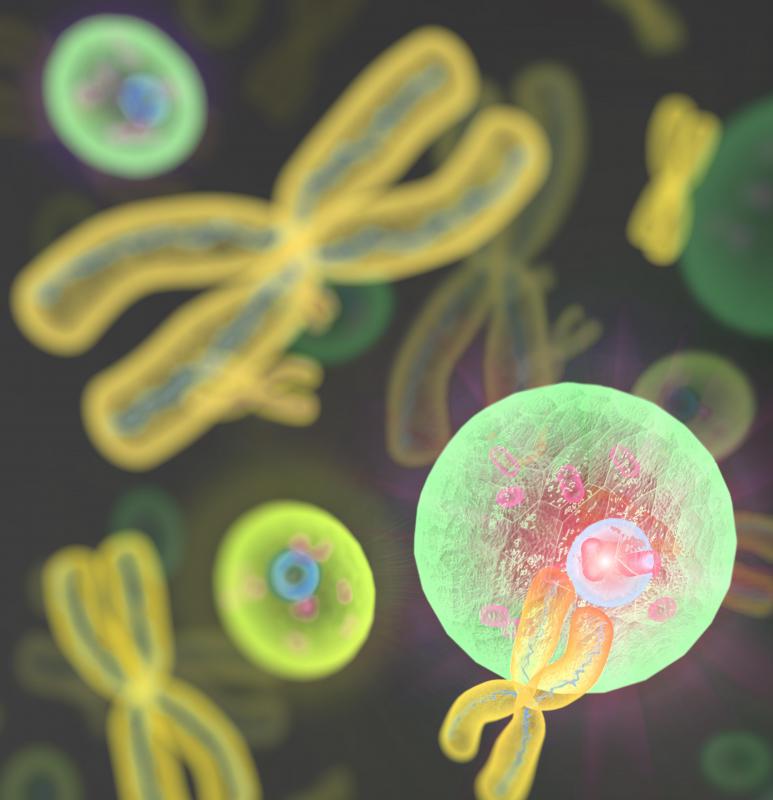At WiseGEEK, we're committed to delivering accurate, trustworthy information. Our expert-authored content is rigorously fact-checked and sourced from credible authorities. Discover how we uphold the highest standards in providing you with reliable knowledge.
What is the BrCA Gene?
The BrCA gene is a gene which all people have. It is responsible for controlling cell growth in the body. Mutations in the gene can put a person at a higher risk for breast and other cancers, including ovarian cancer in women. Many women who are diagnosed with breast cancer ask to be tested for these mutations, to help make decisions about treatment. When people talk about a BrCA test, they mean a test for mutations in the gene, not a test for cancer.
When the BrCA gene functions normally, it inhibits the growth of abnormal cells in the body, acting as a tumor suppressor. Mutations in the genetic material of the gene can cause abnormal cells to develop, because the gene is not able to regulate cell division. However, not everyone with a faulty BrCA gene develops breast cancer; many women with mutated versions of the gene lead healthy, normal lives.

Women are often tested for the gene when they develop breast or ovarian cancer, because presence of mutations make have an impact on the best choice of treatment. In other cases, a doctor may recommend a BrCA gene test for a woman who may be at greater risk. If a woman has a history of breast cancer in her family, her doctor may recommend testing, especially if another member of the family has tested positive for mutations in the BrCA gene. Women of Ashkenazi Jewish descent are also at a higher risk for mutated BrCA genes.

There are two different types of BrCA mutations which are of concern to doctors. The first is BrCA1, found on chromosome 17, while BrCA2 is found on chromosome 13. Mutations in either gene increase the chances of a person developing breast, ovarian, and other cancers. Typically, a doctor will discuss the genetic testing before recommending it, and a counseling session is held after the test comes back to address any concerns that the patient may have. The genetic testing itself is relatively quick and painless for the patient, requiring only a quick blood draw.

For healthy women who have a faulty BrCA gene, extra care should be taken. Some women may choose prophylactic measures to reduce the risk of cancer, such as removal of tissue or medication regimens. Others are encouraged to eat healthy diets and exercise, and to undergo regular testing for abnormal tissue. All women should get it the habit of performing regular breast self exams, and mammograms are also recommended on a regular basis for women over 40.
AS FEATURED ON:
AS FEATURED ON:















Discussion Comments
It is interesting to note that the DNA test provided by 23andme gives clients immediate access to all of their DNA info, except for the BrCA gene. You have to read an additional disclosure before you get access to the data.
1-The BRCA genes are genes that both men and women have. It increases the risk of cancer to both men and women, although because they have the greatest effect on breast and ovarian tissue, women are obviously at higher risk. But men are at higher risk for prostate cancer, male breast cancer, colon cancer and several other types of cancer, although all of these risks are far lower than women's increased risk of breast and ovarian cancer (women are also at risk for colon and other cancers as well).
This is particularly important because many individuals and up to 1/3 of doctors misunderstand this point and think that women cannot inherit these genes from their father (they can) and thus dismiss family history from the father's side of the family.
2-Both BRCA 1 and 2 increase the risk for both breast and ovarian cancer. They both have a 55-85% lifetime risk for breast cancer, BRCA 1 has a 20-60% lifetime risk of ovarian cancer (usually quoted as up to ~40% risk) and BRCA 2 has the slightly lesser risk of up to ~27% lifetime risk of ovarian cancer.
Post your comments